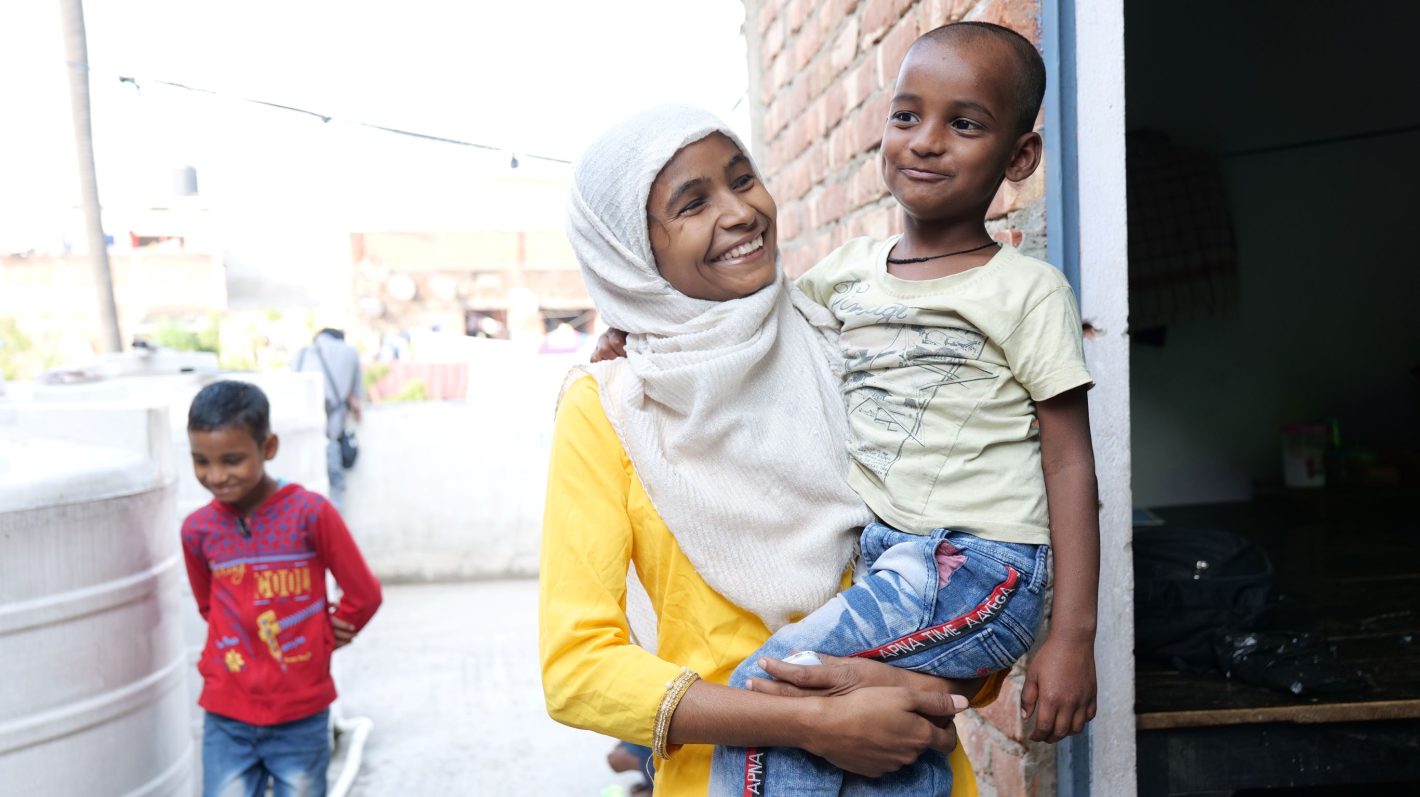When practical and cultural barriers prevent young women from finding paid employment, Project Lehar empowers them to work for themselves instead.
In the low-income suburban neighbourhoods of Patna, northern India, four young entrepreneurs are hard at work. Annu and Gulshan are tailors, Anshu has a beauty parlour, while Saraswati runs a general store. Husneara (23) has not one but two enterprises on the go: a tailoring business and sewing school.
Like many young women in her community, Husneara left school in her mid-teens, when she became a wife and mother. She now has three young sons. Her husband is a labourer, paid by the day, and his income, already insecure, was badly hit by Covid. Money is tight – as it is in most households here. The average family income in these deprived neighbourhoods is less than £40 a month. Living conditions are crowded and unhygienic.
Until recently, Husneara focused on unpaid care and domestic work at home. But since joining Project Lehar and setting up her businesses, she’s been able to significantly boost her family’s finances. Husneara’s sewing students together pay her £17 a month, and her tailoring work brings in additional money too.
‘Since my husband’s income is not enough to support a family of five, the money I’m earning through my skills is crucial,’ she explains.

Project Lehar, run by the Aga Khan Foundation with support from The King’s Trust International, is made up of different, complementary modules which together enable girls and young women from disadvantaged backgrounds to increase their earning power. Many of them are first-generation learners whose parents, often migrants from rural areas, never went to school themselves.
Barriers and restrictions
India has the largest youth population in the world, but only around one in seven young women is in the workforce. Project Lehar Manager Kangkana Bordoloi describes how their opportunities to find paid work are restricted, especially in low-income communities where young women face layer upon layer of disadvantage.
‘Access to formal employment is limited, not least because of mobility and transport issues,’ Kangkana explains. ‘Even when young women find jobs, it can be hard for them to keep them as they can’t afford the transport, or because family restrictions mean they can’t travel.’
Worldwide, women do three times as much unpaid household work as men. Their essential domestic and care work sustains families and supports economies – but is also one of many reasons why it is harder for them to find paid work outside their home. Other barriers include girls’ education being overlooked in favour of boys, and traditional cultural expectations around young women staying at home.

Flexibility and entrepreneurship
But for low-income families like Husneara’s, women’s earning power can be transformative, dramatically improving the quality of life for whole families. And when women’s earning power increases, so too does their influence and independence. So it’s vital to support them to find flexible ways to earn.
This usually involves small-scale entrepreneurship, often based at or near home. Project Lehar provides budding entrepreneurs with vocational training, practical start-up support, and complementary coaching in areas such as enterprise skills, digital and financial literacy. But often, the starting point is simply to raise awareness that entrepreneurship may be an option.
‘We help them develop an entrepreneurial mindset,’ explains Kangkana. ‘We show them what an entrepreneur is, so that they can see a clearer pathway for themselves.’
For many young women, that pathway involves building on their existing skills, such as tailoring, and using them to earn. ‘Stitching is a good way to start working,’ Annu explains, ‘It enables a woman to work from home, alongside managing her other responsibilities.’

Husneara echoes her sentiments: ‘I work from home. I’m self-employed,’ she explains. ‘I prefer self-employment. It’s more flexible for people like me who need to take care of the home, even though we want to earn. I can work and take care of my kids.’
Income, influence, and independence
Project Lehar works on two levels. Firstly, it supports individual young women to learn, earn and thrive, despite the barriers they face. Secondly, it empowers these young women to drive longer-term change within their families and communities, building efforts to gradually break down those barriers.
Women’s status within their families often shifts automatically when they become valued breadwinners, as Husneara has observed – noting that her husband’s attitude has changed, and she now has a say over decisions around household spending. And she is just one of many Lehar-inspired entrepreneurs who now report dramatic differences in mobility and independence.
‘Before, I used to be afraid to venture outside my home,’ says Annu, ‘Now I go to the market, and I approach new vendors to get work… I’m confident that I’ll make good money during the upcoming wedding season.’

Last year, Lehar rolled out a new programme to further build young women’s skills, confidence, and visibility: the community challenge. This sees young women apply and practise their planning, budgeting, and communication skills in real-life situations, working in small teams to design and deliver a project of their choosing in their local community. Husneara’s group ran an awareness campaign around nutrition and anaemia, while Saraswati’s team painted a mural focused on litter and hygiene.
In poor neighbourhoods with unsanitary housing conditions, low incomes and limited access to health and education services, such campaigns can play a vital role in helping people to stay healthy – especially children. Other teams have focused their projects on changing attitudes and behaviours around topics of particular importance to women, such as early marriage or domestic violence.
As Project Lehar supports young women to take their first steps into earning, entrepreneurship, and public life, it is not only empowering them to improve their own quality of life and develop their communities, it is also helping to transform perceptions around young women’s roles, capabilities and status.

